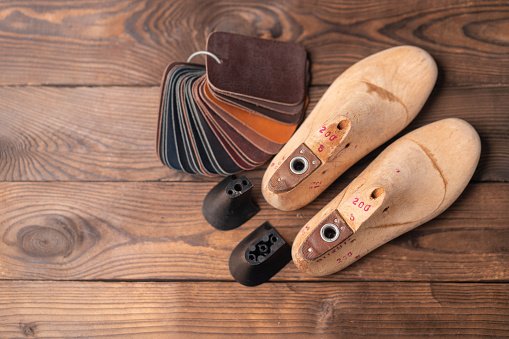Introduction.
Starting a shoe-making business in Nigeria can be a game-changer, especially with the country’s booming fashion industry and the increasing demand for quality, locally-made footwear.
From the streets of Lagos to the markets of Kano, Nigerians love good shoes, and with the right skills and a solid plan, you can tap into this growing market.
But before you jump in, it’s important to know that running a shoe-making business involves more than just creativity and craftsmanship.
It’s about understanding the market, having the right tools, and most importantly, knowing how to turn your passion into a profitable business.
In this guide, I’ll walk you through everything you need to know to start your shoe-making venture in Nigeria – from initial planning to actual production, marketing, and scaling.
Let’s get right into it!
How Do I Start a Shoe-Making Business In Nigeria?
1. Understand the Market and Identify Your Niche
Before you start making shoes, it’s important to know who you’re making them for. Nigeria is a diverse country with a variety of cultures, preferences, and styles.
Some people love colourful, traditional slippers, while others prefer stylish leather shoes for formal occasions.
It’s up to you to decide which group you want to cater to, whether it’s high-end leather shoes for professionals, trendy sneakers for the youth, or durable sandals for everyday wear.
Researching your market is crucial. Take a look at what’s trending, the pricing structure, and your competitors. Are there gaps in the market?
Maybe there’s a shortage of locally-made, quality shoes at affordable prices. Or perhaps there’s an underserved demand for eco-friendly, sustainable footwear. Understanding these factors will help you stand out and attract your target customers.
2. Learn the Craft
You don’t need to be born a shoemaker, but you do need to learn the basics of shoe-making if you want to produce high-quality footwear.
Fortunately, Nigeria has a rich history of craftsmanship, and many local artisans can teach you the ropes. You can also find online tutorials, take courses, or attend workshops to hone your skills.
You’ll need to learn how to work with different materials (leather, rubber, fabric, etc.), how to use tools like hammers, sewing machines, and stitching needles, and how to measure and design shoes. Over time, you’ll develop your style and techniques that make your shoes unique.
3. Source Materials
The next step is sourcing the materials you need. In Nigeria, leather is one of the most popular materials for shoe-making, but you’ll also need rubber, fabric, thread, and other components depending on the type of shoe you’re making. It’s important to find reliable suppliers who can provide quality materials at reasonable prices.
Consider visiting local markets or connecting with suppliers online. Some well-known Nigerian suppliers like the Lagos Leather Market or the Aba Shoe Market are excellent places to find high-quality materials at competitive prices.
You can also look into importing materials from countries like Italy or China if you want to explore more premium options.
4. Set Up Your Workspace
Now that you have the skills and materials, it’s time to set up your workspace. Your workspace doesn’t have to be huge, especially when you’re just starting.
You can begin with a small workshop at home, a rented space, or even a corner in a market stall. What matters is that you have enough room to work comfortably, store your materials, and showcase your products.
You’ll need a few essential tools to get started, like a cutting table, a sewing machine, and molds. As you grow, you can invest in more specialized equipment, but for now, keep things simple and affordable.
5. Create Your First Collection
This is where the fun begins! Start by designing a few sample shoes. You might want to create one or two types of shoes to begin with – for example, a stylish sandal and a classic formal shoe. This allows you to test different designs and see which ones resonate with your customers.
When you’re creating your shoes, focus on quality and craftsmanship. Remember, Nigerians are known for appreciating good, durable products.
Make sure that your shoes are not only beautiful but also comfortable and built to last. Word-of-mouth marketing is huge in Nigeria, and satisfied customers will help you build a solid reputation.
6. Pricing Your Shoes
Pricing can be tricky. You want to make sure you cover your costs while still keeping your shoes affordable for your target market. The key here is to strike a balance between affordability and profitability.
Don’t just guess the price—calculate the total cost of production, including materials, labor, transportation, and overhead costs. Add a reasonable profit margin, but make sure you’re still within the range your customers are willing to pay.
Also, keep in mind that Nigerian consumers are highly price-conscious, but they’re also willing to pay more for high-quality, durable products. Be sure to offer value in every pair of shoes you sell.
7. Market Your Shoes.
Once you’ve made your first batch of shoes, it’s time to start marketing. Social media is your best friend here, especially platforms like Instagram, Facebook, and TikTok, where you can showcase your designs to a wide audience.
You can share pictures and videos of your shoes, provide behind-the-scenes looks at your production process, and even host giveaways to generate buzz.
If you’re able, consider opening a small online store where customers can place orders directly. Platforms like Jumia or Konga are also good places to list your products and reach a larger audience.
Don’t forget to use local markets and retail outlets to promote your shoes as well. Sometimes, the best marketing happens face-to-face, and having your shoes available in a local store can be a great way to build credibility.
8. Build Your Brand and Expand.
As your shoe-making business grows, think about building your brand. Your brand is what will set you apart from the competition and keep customers coming back. Focus on quality, customer service, and creating a brand identity that resonates with your audience.
In the future, you might want to expand your line of shoes, hire more staff, or even open your own shop. As your business grows, it’s important to continually adapt and innovate. Keep an eye on new trends, pay attention to customer feedback, and always look for ways to improve your craft.
FAQs
1. How much money do I need to start a shoe-making business in Nigeria?
The amount of money you need to start a shoe-making business varies depending on your scale, location, and the type of shoes you plan to make.
You can start small with as little as ₦50,000 to ₦100,000, covering basic tools, materials, and a small workshop. As your business grows, you can invest more in equipment, marketing, and staff.
2. Do I need any formal education or training to start a shoe-making business?
While formal education is not required, having some hands-on training or apprenticeship with experienced shoemakers will be very helpful. You can also learn through online tutorials or attend workshops to build your skills.
3. How can I ensure my shoes are of high quality?
The key to high-quality shoes is using the right materials, paying attention to detail, and focusing on craftsmanship. Take your time with every pair and ensure that you’re always improving your skills. Also, invest in good tools and equipment to make your work easier and more efficient.
4. How can I price my shoes competitively?
To price your shoes, calculate the total cost of production, including materials, labor, and overheads, and then add a reasonable profit margin. It’s also important to research the market to see what your competitors are charging and ensure you’re not overpricing or underpricing your shoes.
Conclusion
Starting a shoe-making business in Nigeria can be incredibly rewarding if you’re passionate about quality footwear and willing to put in the hard work. It’s a journey that requires creativity, patience, and a solid business strategy.
But with the right tools, skills, and determination, you can create a successful business that’s not only profitable but also makes a real impact on your community.
So, are you ready to step into the world of shoe-making? What kind of shoes will you create that will make your mark in Nigeria?





GIPHY App Key not set. Please check settings